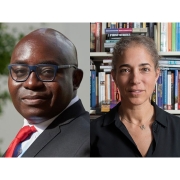Researchers Push the Limits of Organic Synthesis
A dendritic molecule is one that grows by branching in several directions from its center core. At each branching point, the molecule branches again into a new generation. These molecules can be used for a broad range of biomedical applications, including gene and drug delivery.
In 1983, Nobel Laureate Pierre-Gilles de Gennes predicted that as these molecules continue branching into new generations, the functional groups on the periphery will get so crowded that their reactivity will decrease.
But now, in a paper published in the Proceedings of the National Academy of Sciences, researchers have shown that the organic synthesis breaks down completely and the reactions stop altogether. These results could improve the efficiency of gene and drug delivery and could also provide a new plan of attack in the rising antimicrobial-resistance problem.
The research was led by Virgil Percec, the P. Roy Vagelos Professor of Chemistry; postdocs Davit Jishkariani, Yam Timsina, Silvia Grama, Srujana Yadavalli, Ralph-Olivier Moussodia and Pawaret Leowanawat; graduate students Syeda Gillani and Masoumeh Divar; and undergraduate student Angely Berrios Camacho. Penn alumnus Christopher MacDermaid provided the computational simulations.
“This is a fundamental event for the field of dendrimes, as well as the fields of organic chemistry and iterative synthesis,” Percec says. “When you take these molecules and interact them with nucleic acids, the reactivity becomes zero and they stop reacting. Therefore, you can predict what molecule to make at a smaller generation so that all the groups are going to interact.”
Click here to read the full story.





